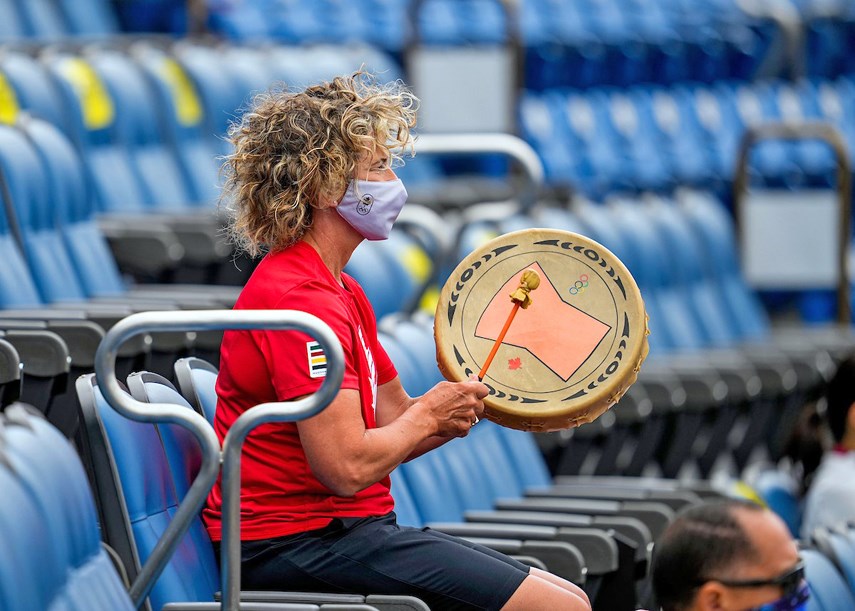“Since Day 1 – I saw it, I paused my PVR, took a picture of it, and shared it with all of our family,” he says with pride.
As much as he’s savoured watching Canada go for gold, he’s not talking about pausing for the athletes themselves necessarily.
Joseph, along with his family from the Squamish Nation, has specifically been drawn to the small screen, hoping to see Marnie McBean, Team Canada’s Tokyo 2020 Chef de Mission, carrying around the custom-made hand drum they gave her for the purpose of her mission – to lead Canada’s delegation of athletes at the Tokyo Games.
“It’s just been the most immense pride to see Marnie there in Tokyo,” says Joseph, who was CEO of the Four Host First Nations for the Vancouver 2010 Olympic Winter Games. “It’s like we’re there with her.”
Prior to leaving for Japan, McBean – herself a three-time Olympic gold medallist – reached out to fellow Olympian and Joseph family friend Clara Hughes to see if bringing a traditional Coast Salish drum would be an appropriate way to fete Canadian athletes from the near-empty stands in Tokyo.
Hughes connected McBean with Joseph, who got to work commissioning Squamish drum-maker and artist Alice Guss for the task.
“We wanted something that was made by a Squamish Nation member,” says Joseph.
He presented the drum, along with messages from the Squamish Nation community and orange lapel ribbons, to Canadian Olympic Committee president Tricia Smith during a ceremony held at Chief Joe Mathias Recreation Centre in North Vancouver on July 8.
The ceremony was conducted by Xwechtaal Elder Dennis Joseph along with Joseph’s son Ghee-ka-laas (Koru Joseph).
The drum now goes nearly everywhere McBean goes in Tokyo, and the Chef de Mission has been a constant source of enthusiasm and thumping with pride at events all throughout the Games – the drum providing a useful countermeasure to the International Olympic Committee putting the kibosh on cheering and other celebrations at the Games as a COVID-19 precaution.
The rim of the drum showcases the eye of the Creator and the ancestors looking down upon McBean and the athletes of Team Canada, notes Joseph. The centre of the drum features a Kwakwaka’wakw copper shield, which represents wealth, honour and respect.
The drum also features a Maple Leaf and includes the colour orange to represent standing together in “strength, respect, solidarity and family.”
The drum is supposed to represent the heartbeat of the First Nations on an international stage and has also become a heartbeat of Team Canada, says Joseph.
“I believe in our country we need healing, as we go through reconciliation. When we talk about the heartbeat of First Nations, and we talk about the heartbeat of a community and a country with each beat, it should connect us more and more with one another,” he says. “On an international stage, when people see Marnie beating that drum, it’s also not just Marnie and Team Canada, but it’s all of us Indigenous peoples across this country.”







